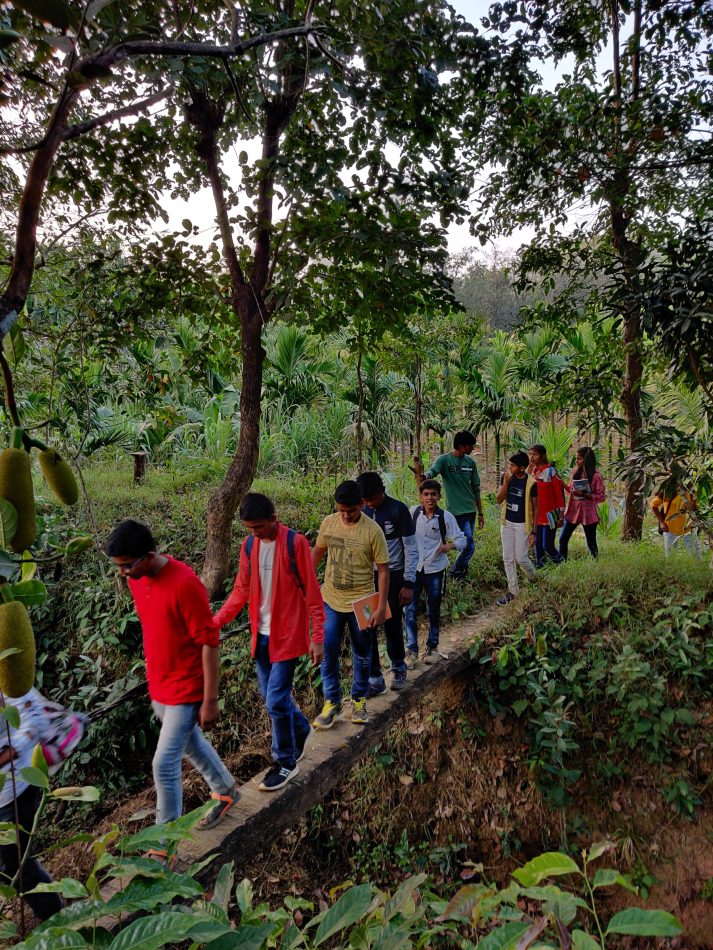Forests contribute to the prosperity and well-being of current and future generations. Forests covering one-third of the Earth’s landmass. are the most biologically diverse ecosystems on land, home to more than 80% of the terrestrial species of animals, plants and insects. Somaiya Vidyavihar is committed to protect and preserve the environment. One of the ways we do this is by raising awareness amongst youth of the importance of all types of forests. Somaiya Centre of Experiential Learning ( SCEL) organises activities involving forests and trees, to bring youth in touch with nature t understand and appreciate its beauty and contribution.
On International Day of Forests, we chat with Parth Bapat, Consultant – Experiential Learning, Somaiya Center for Experiential Learning
 “The existence of healthy, functional forests is intrinsic to human well-being. Humans are evolved to survive and thrive by utilizing the goods and services provided naturally by forests and other ecosystems. These free goods and services include not only breathe-worthy air, clean water reserves, life-saving medicines, critical domestic fuel, fertilizer and pasture that support all subsistence agriculture, globally traded timber, flavourings, dyes and many more life-enriching materials, but also cultural services, such as religious, aesthetic and recreational value for humans.
“The existence of healthy, functional forests is intrinsic to human well-being. Humans are evolved to survive and thrive by utilizing the goods and services provided naturally by forests and other ecosystems. These free goods and services include not only breathe-worthy air, clean water reserves, life-saving medicines, critical domestic fuel, fertilizer and pasture that support all subsistence agriculture, globally traded timber, flavourings, dyes and many more life-enriching materials, but also cultural services, such as religious, aesthetic and recreational value for humans.
Technology, though fundamentally dependent on such natural capital, has created in the minds of its users, a misleading sense of independence from nature. As a result, humans are either neglecting or over-exploiting such natural resources.
The effects of this mismanagement are manifesting in disturbing forms: increasingly dysfunctional ecosystems, landslides, loss of cultivable land, collapse of fisheries, floods or droughts, poor nutrition, increased vulnerability to disease with the impact of each being exacerbated by the phenomenon of climate change.
In all our educational programmes, we try to sensitize participants to the interconnections between natural systems and the world of humans. As they explore and understand the fundamentals of the physical world around them and engage with communities to discover myriad human approaches and lifestyles, we encourage them to ruminate on alternatives, consider sensitive choices and devise more sustainable resource management systems.
As governments and communities around the world mark International Day of Forests 2020, we look back fondly on all our forest-based learning modules that introduced and connected our participants to these dynamic and diverse ecosystems and look ahead to a world of forest-sensitive individuals and communities.”
We also spoke to some of the students of The Somaiya School who participated in ‘Anubhuti’ the immersive learning programme by SCEL. Getting in touch with nature influences the minds and hearts to care for the precious gift of nature.
The photos and the words showcase the connect.
“Anubhuti helped us learn about how nature manages itself and how the nature or environment responds to different human activities. We learnt about the various and different trees and birds during the Nature trails. My interest in the environment and its conservation has always been upgrading with such programmes.”
Keshav Madhusudanan, 6C

“During the Anubhuti, I learnt that forests are to be conserved and that there are a lot of wild species in India. As a part of the programme we visited the Daroji Sloth Bear Sanctuary in Karnataka, the only Sloth Bear sanctuary in India where we spotted 5 Sloth Bears in the wild. It has made me think more about the environment and how to save the endangered species.”
Vidyut Subramanian, 7A

“All the Anubhuti programmes have been different and we had different experiences. We felt connected more with the natural heritage of India. The experience was an adventure filled with a lot of fun while learning about and in connection with Mother Nature. I pledged to value the forest even more now because of the exposure of these visits gave us.”
Tanya Matlani, 9B
“Through Abubhuti, I learnt about different types of trees, plants and flowers. I personally enjoy Micro Photography and hence the programme helped me learn more about flowers and different angles to capture their shots.I have been to many different places like where we explored Dhananu, Ratnagiri and Hampi with the Anubhuti Programmes. Anubhuti Programmes have enabled me to learn about how to click photos related to environment, especially flowers and insects.”
Maitik Patoliya, 8A
“It’s been very informative journey with the Anubhuti on different programmes. I have learnt a lot about India’s Natural vegetation and infrastructure. During our Anubhuti Programme to Goa we explored the traditional Spice Plantations. We also planted sapplings. It had been a very ecofriendly experience. From the last Anubhuti trip to Bandhavgarh National Park, I have learnt the importance and value of the forest by looking at the beautiful biodiversity of the forest and we should conserve it.”
Freya Thakkar, 9B
“We learnt history of various places that we visited during the Anubhuti programme. An important learnt during the programme was to address the need of the hour; safeguarding the richness of our environment and culture. Especially, Anubhuti programme at Hampi we discovered the past and present cultural & natural heritage of the location. After my trip I made up my mind to do my bit on reducing Plactic pollution and planting trees to save our environment.”
Soham Chiplunkar, 7B



